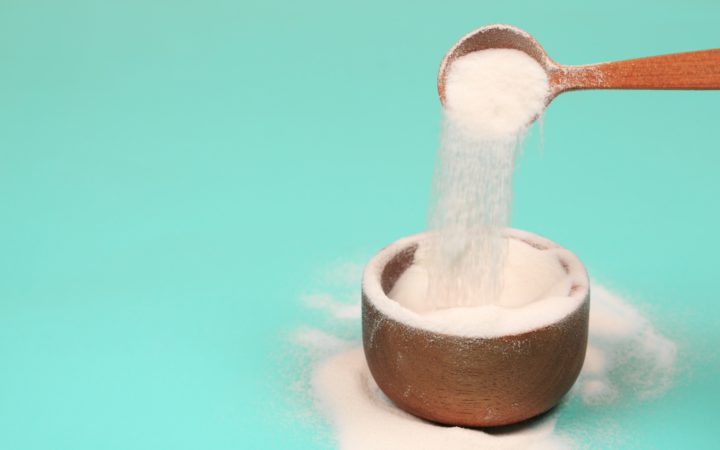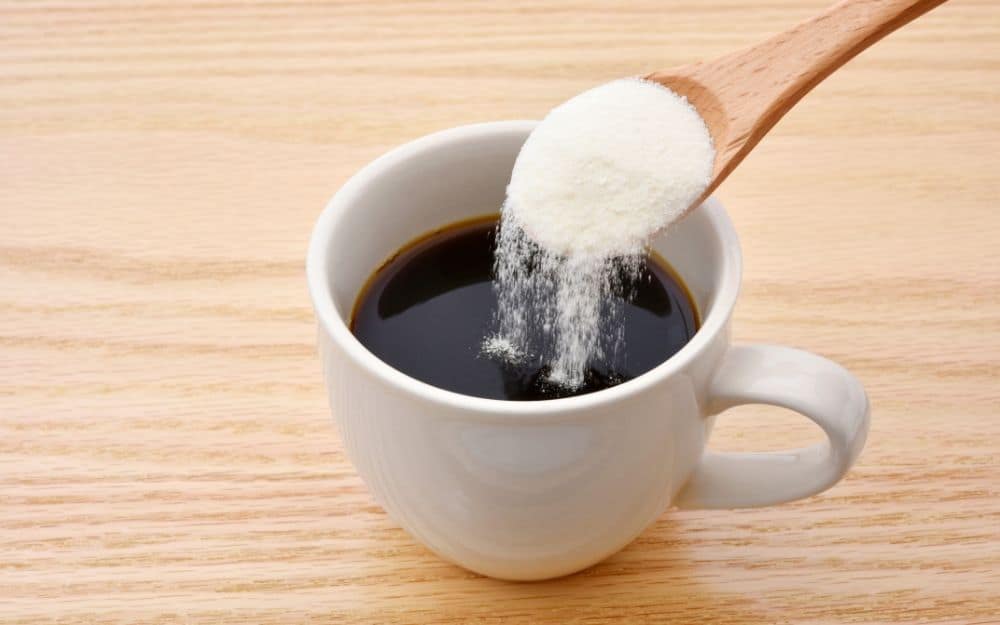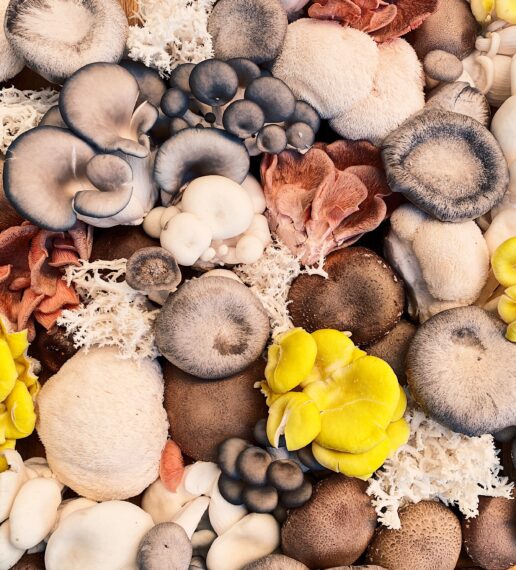Collagen for Athletes? Here’s What The Science Says

“Collagen? Isn’t that the stuff they put in wrinkle creams?”
Yes, but skincare isn’t the only thing collagen is good for.
Unbelievably, every athlete should consider adding collagen to their diet!
Here’s what the science says about collagen for athletes, muscle growth, recovery, physical performance, and much more.
The Benefits of Collagen for Athletes of All Ages and Levels
Up to 10% of muscle mass consists of collagen. Many people don’t realize that collagen is a protein.
While it’s not a complete protein (collagen lacks one of the nine essential amino acids), adding collagen supplements to your routine can seriously boost your workout potential!

1. Collagen Peptides Reduce Joint Pain (Especially Activity-Related Joint Pain)
While some folks swear by glucosamine and chondroitin, there isn’t much evidence that shows either of these supplements (or a combination of them) does much to improve cartilage and connective tissue, effectively reduce joint pain, or improve mobility.
Research shows that collagen, on the other hand, is an excellent supplement for supporting joint health and reducing activity-related joint pain from osteoarthritis.
It’s never too early to start taking a collagen supplement for bone and joint support, but people 30 and up may reap the most benefit.
As you age, your body’s own collagen production starts to slow down. Your joints, skin, and connective tissue across your entire body need collagen to stay flexible and healthy.
Even your spine and vertebrae require collagen for mobility.
A 24-week study found that athletes who took a collagen supplement experienced less joint pain both at rest and during physical activity. (1)
In another study, adults who took just two grams of hydrolyzed collagen each day for about two-and-a-half months noticed less joint pain and had an easier time exercising. (2)
Taking between 8 and 12 grams per day seems to be your best bet for improving soft tissue health and reducing muscle soreness. (3)
To reap the most benefits of collagen for joint health, add some vitamin C. Studies show that vitamin C can double collagen production in joints. (4)
2. Collagen Supplements Can Boost Muscle Mass
Collagen comprises up to 10% of your muscle tissue. (5)
Did you know that every decade after age 30, your muscle mass deteriorates by about 5%? (3)
It’s called sarcopenia and it’s no coincidence that collagen production slows down during this time.
Surprisingly, research suggests that collagen peptides encourage optimal creatine synthesis which can boost post-workout muscle growth. (7)
One study looking at frail men found that collagen supplementation significantly improved muscle mass and strength so collagen can help you defend your muscles from age-related deterioration. (8)
3. Hydrolyzed Collagen Peptides Support Connective Tissue and Injury Prevention
Since all connective tissue and muscles require collagen, including hydrolyzed collagen in your diet can defend your body against injuries.
As collagen levels get lower, your tendons and ligaments become stiffer and this puts you at risk for sports injuries.
Have you ever wondered why people over 30 experience more herniated discs, knee injuries, and shoulder problems?
While many factors contribute to injuries, collagen levels and flexibility play a large part.
That’s why one study found that raising collagen levels in connective tissue is vital for injury prevention in athletes. (9)
Other research suggests that collagen may also help your body heal from injuries because it prevents scar tissue build-up. (10)
4. Collagen Protein and Its Amino Acids
May Improve Athletic Performance
Collagen’s interesting amino acid profile may help boost athletic performance.
Hydrolyzed collagen supplements hold eight of the nine essential amino acids that your body can’t make on its own.
The only amino acid missing is tryptophan.
However, collagen also has some non-essential amino acids beneficial for muscle growth, too.
Important levels of proline, alanine, glycine, hydroxyproline, and arginine stimulate creatine production in your body which can boost athletic performance and stamina during muscle contractions.
5. Collagen Peptides Help Support a Good Nitrogen Balance
Bodybuilders often talk about the importance of keeping a good nitrogen balance for muscle mass growth.
If you’ve never heard your friends who lift mention collagen peptides, you may want to let them know about this.
Concrete evidence is lacking, but many swear that balanced nitrogen levels help your body stay in an anabolic state — which is optimal for muscle growth.
One study following older women found that collagen supplements can help support a high nitrogen balance. (11)
6. Hydrolyzed Collagen May Speed Up Muscle Recovery Time
Collagen protein may also help your muscles recover in between workouts as well.
As the building blocks of muscle, amino acids are vital for building lean body mass and helping muscles recover from the stress of exercise.
7. Collagen Protein May Jumpstart Your Metabolism
The glutamine, glycine, arginine, and other amino acids in collagen can boost muscle synthesis and encourage your body to burn stored fat.
One study found that taking extra amino acids with whey protein powder improved weight loss potential. (12)
Don’t forget that collagen is also a protein: the most abundant protein in the human body!
While it’s not a complete protein, adding collagen protein powder to your diet can support overall muscle mass and metabolism thanks to the special amino acids.
Enjoy the benefits of collagen supplementation by tossing a scoop into your post-workout smoothies — you won’t even taste it.

Health Benefits of Collagen for Women
As natural collagen production slows with age, bones can become brittle and skin loses elasticity. Collagen can help!
Collagen Peptides Can Reduce Wrinkles, Fine Lines, and Sagging Skin
Plenty of studies also highlight the benefits of collagen for skin health. (13)
No overpriced swindle here!
Collagen supplementation on a regular basis can improve skin hydration and elasticity while reducing the appearance of fine lines, wrinkles, and sagging skin.
As a bonus, consuming collagen protein powder can also improve natural collagen synthesis and production inside your body.
Collagen Supplements Can Help Prevent Bone Loss
Certain types of collagen are also great for avoiding age-related bone loss.
Women are especially at risk for developing osteoporosis. Unfortunately, it’s impossible to notice any warning signs.
Instead, recent studies show that women can improve bone mineral density with collagen. (14)
Collagen also reduces proteins in the blood that cause bones to deteriorate — so it works from two angles! (15)

Health Benefits of Collagen for Men
Women aren’t the only ones who can benefit from collagen. Men can also reap the benefits — and not just for sports nutrition!
Collagen Protein May Prevent Hair Loss
Male pattern baldness is largely hereditary but your diet, lifestyle choices, and overall health also play important roles.
Since collagen improves skin health, it can keep your hair follicles and scalp healthy to help slow down hair loss.
Collagen Supplements Can Help Defend Against Heart Disease
People tend to forget that the heart is a muscle: a complicated muscle filled with arteries and blood vessels.
Heart disease is the leading cause of death in the United States among both men and women. Poor diet and lack of exercise play a large part in this statistic.
While there’s no substitute for a good diet, vital protein and amino acids in collagen can further defend your heart against hardening, plaque build-up, and disease.
As collagen production drops with age, collagen levels in the heart also become more rigid.
That’s why studies have found that collagen supplementation can reduce hardening, keep arteries and blood vessels in the heart flexible, and reduce risk of heart attacks. (16)
Other Athletic Recovery Supplements to Consider
Don’t underestimate the importance of adequate sleep and immune support for reaching and keeping your fitness goals.
The supplements below can help fill gaps in your diet, reduce inflammation, and support your immune system.
- BCAAs: A combination of branch-chain essential amino acids, the building blocks of muscle — leucine, isoleucine, and valine — which can reduce fatigue and soreness after workouts while improving muscle mass.
- Omega-3 fatty acids: While some low-level inflammation is good for building muscle, chronic inflammation is not. Omega-3s can help strike a balance and reduce inflammation.
- Multivitamin: Look for a multivitamin specifically for athletes. Even with the best diet, it’s nearly impossible to consume all the vitamins, minerals, antioxidants, and nutrients your body needs on a daily basis.
- Medicinal mushrooms: Fitness enthusiasts love medicinal mushrooms like chaga and cordyceps because they contain high levels of unique antioxidants and beta-glucans to help fight inflammation and balance your immune system. Cordyceps, for example, can boost your oxygen uptake to cells and muscles.
The Bottom Line
Yes, collagen is great for improving skin hydration and reducing wrinkles. However, it’s also an excellent workout supplement!
Collagen, along with other vital immune-boosting supplements like medicinal mushrooms can help athletes reach full physical potential while staying healthy.
Unfortunately, vegans can’t take collagen most collagen supplements. While grass-fed bovine collagen is readily available, vegan options don’t exist.
Instead, vegans can consume foods that boost natural collagen production in the body and take plenty of amino acids.
Since bone broth only contains collagen and not collagen peptides, you’re better off choosing a supplement powder with vital proteins and amino acids from collagen.

